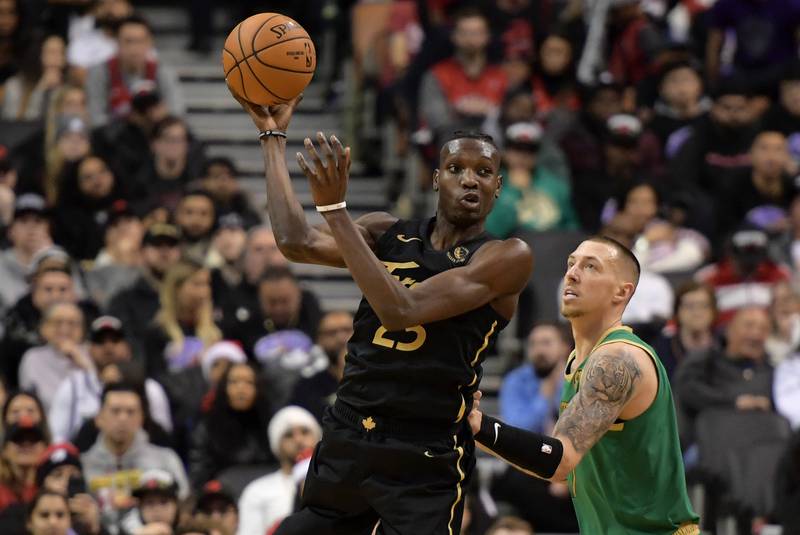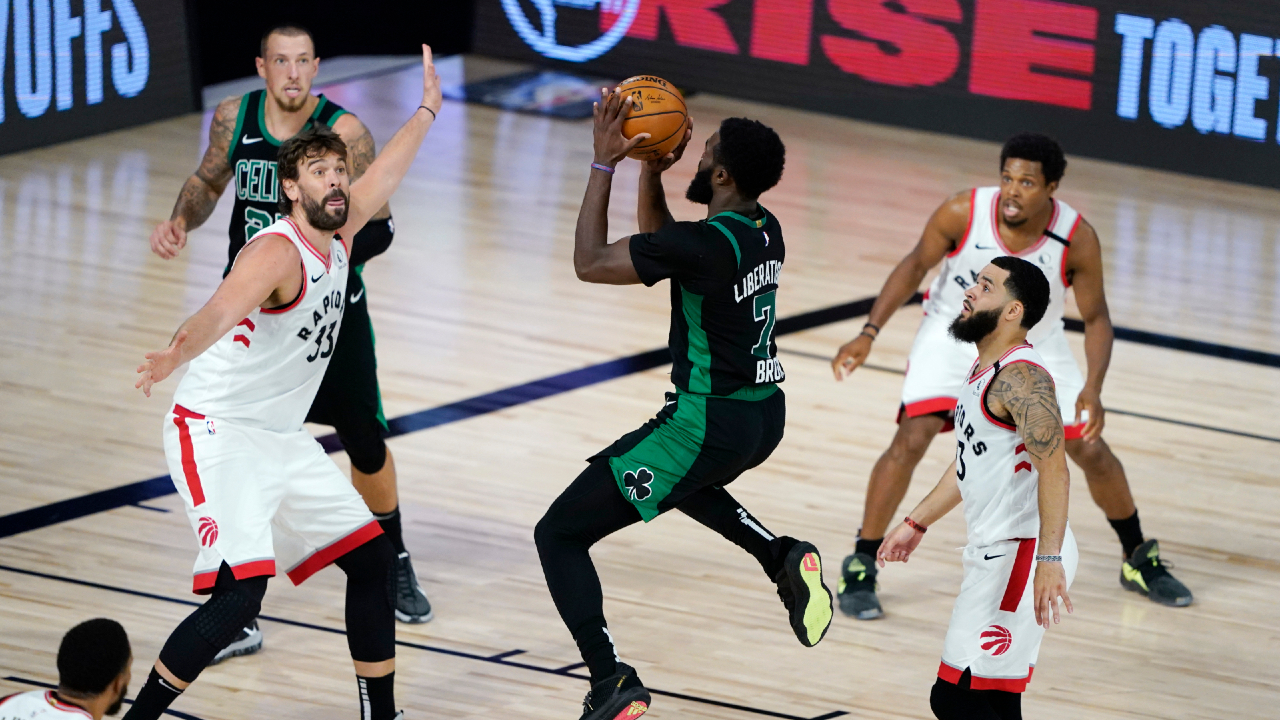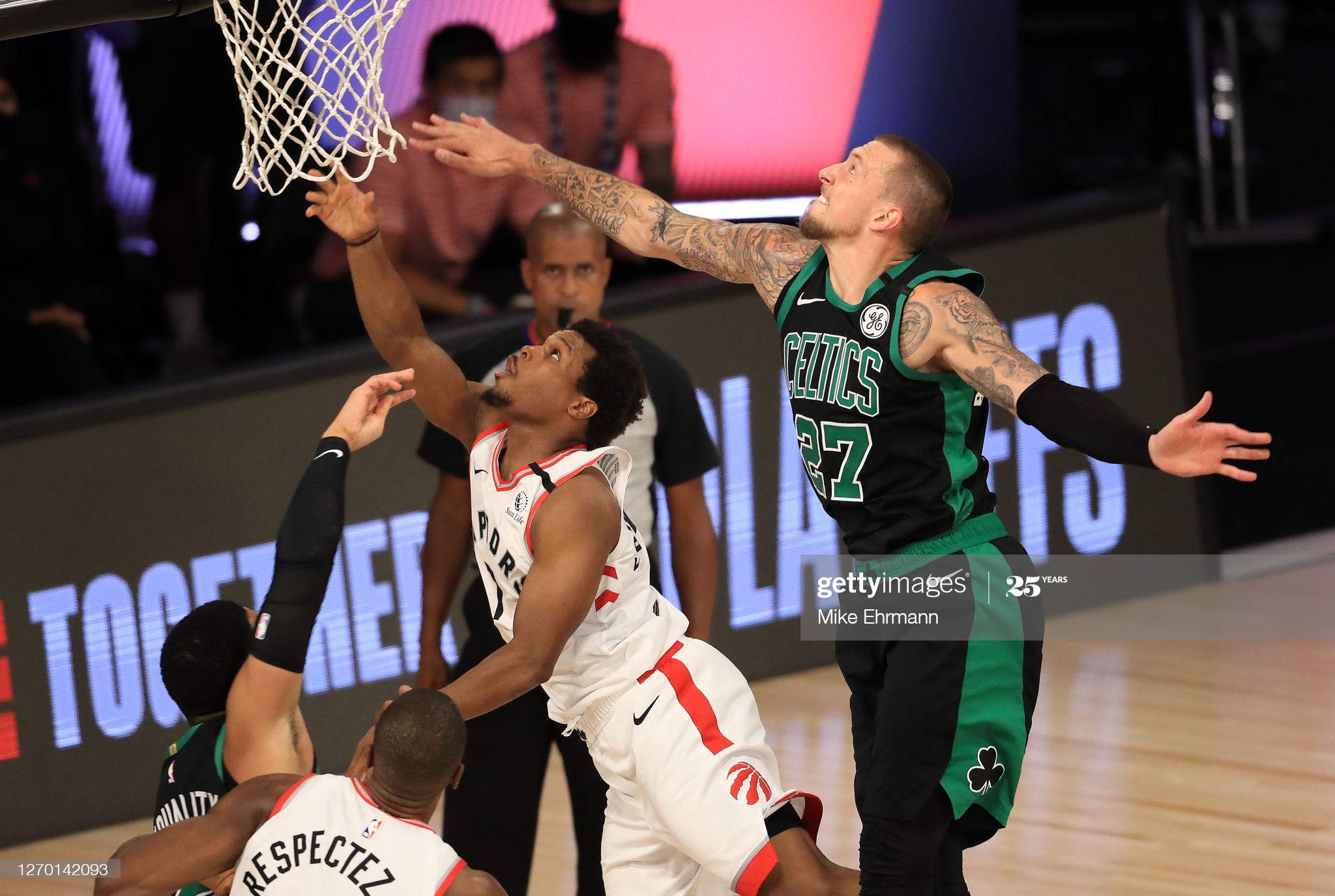Tin Cup, in his titular movie Tin Cup, qualified for the US Open while using only a 7-iron for the whole back nine. His trusty caddy, Romeo, snapped the driver and 3-wood over his knee when Cup refused to play it safe. In response, Cup snapped every other club in his bag but the 7-iron. It was something like playing with ankle weights for him; when Cup did go to the US Open with the full cadre of clubs, he was ready to win (once he got over the shanks). Once he brought his driver out of his bag, he was ready.
The Toronto Raptors still have the proverbial driver in their bag. In game one against the Boston Celtics, the Raptors cut the rotation to a clean eight, with Terence Davis taking the final spot alongside Norman Powell and Serge Ibaka off the bench. A variety of important Raptors didn’t play until pseudo-garbage time, but the most intriguing name of the bunch is Chris Boucher. He, as much as any basketball player can be compared to a golf club, is a driver. It’s time for the Raptors to stop limiting themselves to the 7-iron and start letting the big dog eat.
Boucher’s presence could go a long way towards solving some of the Raptors’ problems. The Raptors lack energy, and Boucher is one giant B-12 injection. When he gets going dunking the ball, catapulting triples on the other end, and spanking opponents’ shots out of the mortal plane, it’s impossible for teammates not to rise to the occasion. When Boucher played, Toronto’s texture as a team changed this season. Here are some of Boucher’s most dramatic on-off numbers, all per Cleaning the Glass.

When Boucher was on the court, the Raptors were far better this season at running the ball, creating shots at the rim, and rebounding misses. Of course, it didn’t always translate to better basketball, and the Raptors actually had a worse net rating with Boucher on the court than with him off, excluding garbage time. That being said, Toronto still had a healthy net rating of 5.7 with Boucher playing, so they still won his 819 regular season minutes, and his net rating was higher than that of teammates like Serge Ibaka, Rondae Hollis-Jefferson, and even Norman Powell and Fred VanVleet. On top of that, Boucher never got a chance to play alongside Toronto’s stars. He may not have the team’s best on-off net rating, but the Raptors can very much still win with Boucher playing.
And the Raptors have won with Boucher playing, specifically against the Celtics. He shot 13-of-17 against Boston over three regular season games, even scoring one off his career-high, with 24 points, on December 25. Toronto won his minutes in those three games by 22 points, despite losing the games by a combined 22 points. The next-highest total plus-minus for Toronto against Boston in the regular season was plus-14. Translation: Boucher was truly a difference-maker. There are a number of reasons to expect why Boucher’s success against Boston in the regular season could continue into this series.
Toronto lacked energy against Boston; Boucher provides energy. He would help jump-start the transition attack, and his presence as a fearsome roller could create more space for VanVleet to operate in the middle of the floor. Boucher is the team’s best lob threat, and a few completed lobs out of the pick-and-roll would also suck Boston’s weak-side defenders into the middle of the floor, opening the weak corner for some easier three-point looks.
In game one, Toronto lacked bounciness at the offensive end. The weakness didn’t show up so much in missed layups as much as deferred layups. The Raptors attempted only 29 shots from within five feet of the rim, while they averaged 34.1 per game in the regular season. Toronto’s guards, particularly Fred VanVleet, struggled to reach the rim, and they passed out of shots when they got there. Bouncier finishers like Powell were the solution for Toronto; when Powell reaches the rim, he can elevate high enough that no amount of pressure from behind can keep him from shooting.
That’s where Boucher would help most. When he played in the regular season, the Raptors took 3.5 percent more shots at the rim, an 89th percentile mark. Boucher is as bouncy as they come, with an endless wingspan, and the ability to whap on all of Boston’s undersized rim protectors. Boucher is bothered most by centers bigger than himself, but Boston doesn’t roster a single seven-footer. Boston’s centers in Daniel Theis and Robert Williams are very good centers, but they are not large for the center position, so Boucher could hold his own on both ends. Furthermore, Toronto played 8.8 minutes with Gasol and Ibaka on the court together in game one, showing their willingness to use two bigs. So Boucher could play alongside either center, and the Raptors would be comfortable in their rotations.
To that point, whose minutes would Boucher actually take? Well, the Raptors actually cut the rotation to a clean eight last game, and Boucher is not going to take minutes from either of the entrenched centers, Gasol or Ibaka. He’s a complement, not a replacement, and the Raptors will have already lost the series if they start slashing the minutes of their most important players. Instead, Boucher could slot in as the eighth man, taking Davis’ 12 minutes. Davis actually was solid, but he doesn’t offer the benefits that Boucher offers.
With four minutes left in the first quarter, the Raptors subbed Davis in for Pascal Siakam, shifting OG Anunoby to power forward. Anunoby has never been at his most comfortable playing power forward, and putting Boucher in instead of Davis would help solve that, too. Davis played until midway through the second quarter. So it was a small-ish shift, and the Raptors actually won it by a point, but giving Boucher that small run could help Toronto put together an even more ferocious stretch. If the Raptors really wanted to force the issue against Boston, Boucher could play alongside another center as well as Siakam and perhaps even Anunoby. Such a look would give Toronto its maximal amount of length on the floor, which could hurt Boston for a short stretch. It would also spell one of Toronto’s two point guards, which is the whole point of playing Davis anyway. So if the Raptors supersized for a short stretch with Boucher, it could be a boon. If it works, he could get minutes in both halves.
Furthermore, Boucher being on the court wouldn’t just solve some of Toronto’s problems, but it would start creating some problems for the Celtics. Boston is not a great defensive rebounding team, and Boucher is a talented offensive rebounder. He doesn’t need teammates to crash the glass, as he can snatch them up all by his lonesome. He grabbed five offensive rebounds in his three regular season games against Boston despite playing only 58 minutes. That Toronto’s rebound rate skied by 10.2 percent with Boucher in the game during the regular season is remarkable; a 99th percentile rate is nothing to scoff at. If Toronto let Boucher attack the offensive glass alone, while sending his four other teammates back, the Raptors could steal a few rebounds while still crushing the Celtics’ transition game. Winning extra possessions could tilt the result in this series.
Boucher is also one of the league’s premier shot blockers behind the three-point arc. In terms of contesting triples, Boucher actually topped Siakam in contests per 36 minutes, and Siakam contested the most triples per game in the league this year. Boucher, Siakam, and Anunoby together alongside a center and a point guard could sever the Celtics from the rim, erasing any open looks from deep, while having a variety of players capable of protecting the rim. That threesome, by the way, played one sole minute together all year, and they didn’t allow an opposing point. It could be worth a try.
Tin Cup, of course, qualified for the US Open, and perhaps would have won it on the final day if he had played safe. Instead, he repeatedly hit the ball into the drink because he only used the driver. He eventually finished the hole with his final ball. That, moving it back to the Raptors, would not be a good result either. But the Raptors wouldn’t need to rely on Boucher forever as much as offer him a short stretch in the series. He won his minutes against Boston in the regular season by a huge margin, and there are tangible reasons to expect that to continue into the playoffs. The Celtics exposed a number of Toronto’s weaknesses in game one. The Raptors could improve in a few other ways, without adapting the rotation, and expect some success there. But one easy way to cut through the red tape would be simple: play Boucher. Let the big dog eat.



